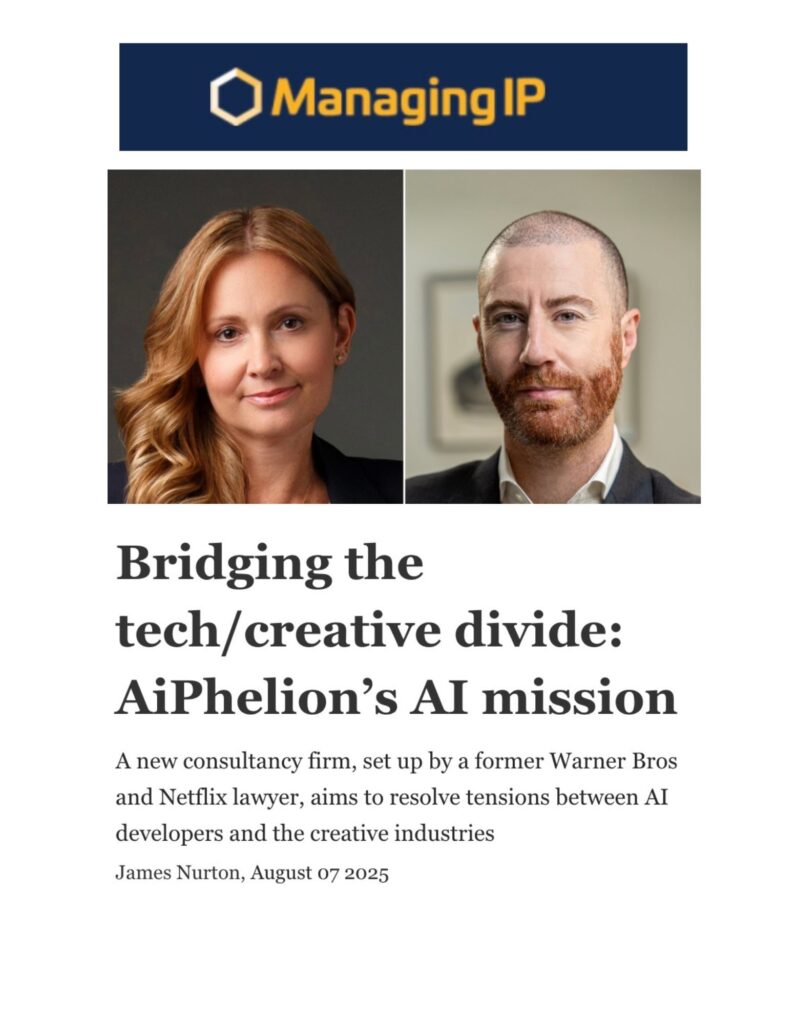AIPHELION INSIGHTS

A new consultancy firm, set up by a former Warner Bros and Netflix lawyer, aims to resolve tensions between AI developers and the creative industries
A team of intellectual property specialists with experience in industry and at law firms has launched a new company, AiPhelion, to provide advice on artificial intelligence (AI) and IP.
The company’s co-founder and CEO, Victoria Furniss, previously spent more than six years at Warner Bros and nearly nine years at Netflix.
It was the latter role, in particular, where Furniss saw both the challenge and the opportunity of bridging the gap between Silicon Valley and Hollywood.
That experience led to achievements such as the creation of the Alliance for Creativity and Entertainment (ACE) to tackle online piracy in 2017, as well as the development and take-up of automated content identification systems such as YouTube’s ContentID.
“We showed how the two worlds can come together,” she says. “Innovation can push forward without creativity being left behind.”
For many in the creative industries, however, the emergence of AI poses even bigger challenges.
AiPhelion aims to address these challenges by offering strategic consultancy and traditional IP services (such as copyright registration and trademark filing) to both technology companies and innovators and creatives.
Furniss founded the business alongside Michael Jury, who previously worked at Disney and Baker McKenzie; Bret Boivin, co-founder and former CTO of Incopro; and John Byrne, former head of Dorsey & Whitney’s London office and founder of litigation funder Therium.
The team is mainly based in the US and UK. They also have a network of consultants they can draw on, who bring experience in both technology and entertainment.
“We think we can find a balance and advise both sides,” adds Jury.
Complementary not competing
As well as advising corporate clients, AiPhelion is working with law firms, some of whom have reached out directly to the new company.
Jury says the company aims to enhance the advice that law firms can provide by using the founders’ industry experience and insights to offer guidance and advice spanning law, policy, and technology across jurisdictions.
“We’re partnering with the best IP firms globally,” he explains.
AiPhelion has developed a bespoke intelligence tool that provides insights into the legal and technical landscapes that impact IP and AI, which it is using to support clients.
“We’re also considering licensing that tool to law firms,” says Furniss.
She adds that AiPhelion has not yet received any funding beyond what its founders have invested.
The company may consider venture capital to develop and roll out the tool in the future, but it aims to retain the “cultural benefits” of being a small, flexible company, she says.
Regulation starts to bite
AiPhelion’s launch comes as AI regulation becomes more complex and challenging.
On August 1 this year, key parts of the EU AI Act affecting providers of general-purpose AI models came into force.
Meanwhile, the UK government has set up a working group to address AI and copyright.
In July, President Trump announced America’s AI Action Plan, saying: “You can’t be expected to have a successful AI program when every single article, book, or anything else that you’ve read or studied, you’re supposed to pay for. We appreciate that, but just can’t do it – because it’s not doable.”
This rapidly evolving regulatory environment makes compliance very difficult, particularly in a global context.
“Where do you base your business? Where do you train? These are really hard decisions to make,” says Furniss.
“AI advice is often fragmented internally. The issues are too wide for one team to handle,” adds Jury. “We can help clients navigate these laws and the uncertainty on how they will be applied.”
Another challenge is that, despite the race to regulate, the law remains behind the development of technology: “The EU AI Act was basically drafted before ChaptGPT was even available,” notes Furniss.
The legal uncertainty is likely to remain given the conflicting priorities facing governments.
Furniss points out that, in the current economic climate, countries don’t want to be seen to be “turning away innovation”. Equally, policymakers recognise that: “Not remunerating creatives for AI training is not feasible.”
The dilemma may be partly resolved by pending litigation between IP owners and AI developers, such as the cases brought by Getty Images against Stability AI and by Disney and NBC Universal against Midjourney.
These cases are likely to address the scope of existing text and data mining exceptions, the law on fair use, and the role of a licensing ecosystem, says Furniss.
“Commercial solutions can come out of these battles,” she predicts, adding that AiPhelion hopes to be part of those solutions.
She concludes: “We are driven by a deep passion and love for the creative industries and for IP law.”
Article written by James Nurton for Managing IP